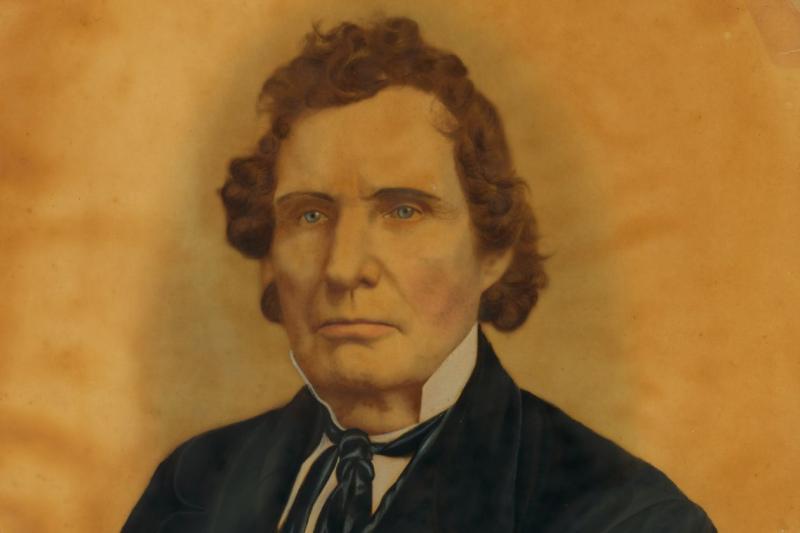'Thaddeus Stevens' Review: Back in the American Pantheon
By: Fergus M. Bordewich (WSJ)



No American political figure has been more distorted in popular memory than Thaddeus Stevens, the Radical Republican congressman who played a major role in guiding the nation's trajectory through the Civil War and after. Along with much else, he pressed the government to face down the threat of secession, to recruit black men into the Union's armed forces and to embrace full emancipation. In the war's aftermath, he led the fight to secure civil rights for all black Americans, including their right to hold public office. He was also a driving force behind the impeachment of Andrew Johnson, who had tried to speedily restore former Confederates to political office in the Southern states. When Stevens died in 1868, at the age of 76, the Reconstruction policies he had championed so ardently were still in place, though they would be sabotaged within a decade.
A postwar convention of freedmen dubbed Stevens a "beacon light of our race," and Frederick Douglass said that he was "more potent in Congress and in the country than even the president and the cabinet combined." But with the arrival of the Jim Crow era, Stevens was reduced to the caricature of a vengeful zealot. In the blatantly racist 1915 film "The Birth of a Nation," he was portrayed in the guise of "Congressman Stoneman," a dupe besotted with a "mulatto" woman who inspired his advocacy for blacks. More broadly, the erasure of the real Thaddeus Stevens epitomized a generations-long effort to denigrate abolitionism and thwart the transformation in American race relations that had begun with the postwar amendments guaranteeing equal protection under the law and voting rights.
Even in the North, Southern views of Reconstruction as an assault on their "institutions" were validated by historians of the "Dunning School"—named for the Columbia University historian William A. Dunning—who held that blacks were fundamentally inferior and who dominated historiography for decades. In 1931, the historian James Truslow Adams described Stevens as "perhaps the most despicable, malevolent and morally deformed character who has ever risen to a high power in America," and in 1937 Stevens's biographer Thomas Frederick Woodley posited that his physical deformity, a club foot, "had eaten into the vitals of his ego" and done "irreparable damage" to his personality.
The modern civil-rights movement inspired a gradual re-evaluation of Stevens, notably in Hans Trefousse's 1997 biography "Thaddeus Stevens: Nineteenth Century Egalitarian." Yet broader recognition of his importance continued to lag. Now Bruce Levine, a retired professor of history at the University of Illinois, restores him fully to his place in the American pantheon with "Thaddeus Stevens: Civil War Revolutionary, Fighter for Racial Justice," a concise and powerful biography. With a firm grasp on the era's political history, Mr. Levine pilots us deftly through Stevens's rise in the Whig Party, his early participation in the antislavery movement, and his part in the founding of the Republican Party, with its opposition to the spread of slavery. He tracks as well the nuances of wartime rivalries and alliances and the fierce battle to enact revolutionary legislation after the war.
Unlike many politicians in any age, Stevens wasn't an opportunistic shape-shifter. He was always blunt about what he believed but pragmatic enough to know when compromise was necessary. He was, in short, an idealist who knew how to get things done. In this, he was a contrast to better-known abolitionists like Sen. Charles Sumner, who was a powerful orator on behalf of the antislavery cause but ineffective at negotiating the passage of legislation.
Mr. Levine is an unabashed but not uncritical admirer of his subject. He regrets Stevens’s brief tactical dalliance with the nativist “Know Nothing” Party in the early 1850s and his ambivalence toward the urban poor. But he rightly praises what made Stevens great. Stevens, Mr. Levine writes, “dedicated much of his life to creating a more egalitarian and democratic form of capitalist society than the one he found,” a vision that included his support for Chinese immigrants suffering from discrimination and for women’s suffrage. He envisioned a merit-based, prejudice-free America in which blacks and whites alike were liberated from oppression, inequality and degradation.
Stevens came by his affinity with the downtrodden virtually ab ovo. Born into hardscrabble poverty in rural Vermont and raised by a strong-willed single mother, he rose by dint of hard work and determination to graduate from Dartmouth and eventually become one of the most sought-after lawyers in his adopted state of Pennsylvania. There, as a member of the state legislature in the 1830s, he forged Pennsylvania’s first law mandating free public education, a controversial idea at the time since many men couldn’t see why they should pay for the schooling of others’ children. He embraced with equal commitment the Whig doctrine of national industrial development and the abolitionism that would come to define his greatest political work. At some personal risk, he allowed fugitive slaves traveling on the Underground Railroad to shelter on his properties.
In 1851, Stevens undertook the defense of several Pennsylvania men, both black and white, who were charged with treason for fighting off slave hunters in a melee in Lancaster County. The case against them was a marquee effort by the administration of President Millard Fillmore to show that it was serious about enforcing the Fugitive Slave Law, enacted the previous year. Of the principal defendant, Stevens declared in court that, by standing up to “professional dealers in human flesh,” he had acted out of “pure and laudable motives.” The jury’s acquittal was a turning point in public resistance to the hated law.
But it was in the U.S. House, in which Stevens served from 1849 to 1853, and then as one of the leaders of the Republican majority from 1859 until his death, that he had his most profound effect. He “regularly staked out a position well in advance of public opinion,” writes Mr. Levine. He “preferred to shape public opinion rather than bow before it.”
Stevens regarded the Civil War as nothing less than a second American revolution, and he threw every fiber of his being into ensuring that it would be a victory for the ideals he believed in. To the political challenges posed by the war, Mr. Levine says, Stevens responded with intellectual flexibility, “reevaluating old assumptions and pressing new initiatives in the face of changing circumstances.” What is more, he had a remarkable ability “to grasp the nature of a given historical moment, to perceive the moment’s implicit logic, to follow that logic to its conclusions, and to fight with all the considerable energy and skill at his command.”
His effectiveness owed as much to his personality as to his parliamentary skill. A colleague described his style as “bitter, quick as electricity, with a sarcastic, blasting wit,” while others dryly referred to the powerful Ways and Means Committee, which he chaired, as the “Committee of Mean Ways.” (The committee under Stevens was central to the herculean task of financing the Union war effort.) In debate, he wasn’t as florid as his fellow members, typically speaking in a low, deliberate voice, “dropping his sentences as though each one weighed a ton,” as the journalist Noah Brooks put it, and launching sarcastic broadsides at his opponents “as coolly as if he were bandying compliments.”
The trench warfare of politics and the furnace of war fortified Steven’s conviction that men must be pushed as well as led toward fulfillment of the Founding Fathers’ ideals. In July 1868, he delivered what was in effect his political epitaph, soon after the House’s ratification of the 14th Amendment, the essential principles of which (involving due process and equal protection) he had done so much to shape. Speaking from his chair because he was too ill to rise, he said: “If you and your compeers can fling away ambition and realize that every human being, however lowly-born or degraded, by fortune is your equal, that every inalienable right which belongs to you belongs also to him, truth and righteousness will spread over the land, and you will look down from the top of the Rocky mountains upon an empire of one hundred millions of happy people.”
Mr. Levine is a fine guide to Stevens’s political career. Surprisingly, he leaves unexplored Stevens’s remarkable relationship with Lydia Hamilton Smith, a woman of mixed race who began working as his housekeeper in Lancaster and who became his business partner, friend and sometime companion at public events. There has long been speculation about the nature of their relationship, which Steven Spielberg’s film “Lincoln” presented in a memorable bedroom scene as, in essence, a common-law marriage. There is, however, no proof that the relationship was sexual.
Mr. Levine also scants Stevens’s other personal relationships—apart from his mother’s intense influence—such as those with his nephews, for whom he filled the role of stand-in father, and with former president James Buchanan, Stevens’s conservative Lancaster neighbor. But these lapses are only modest shortcomings in a work that stands as a fitting monument to one of the most formidable gladiators ever to stride the halls of Congress.

Tags
Who is online
48 visitors


I do recall a school textbook that described him as a radical.
Here's a guy we should be putting on the currency.